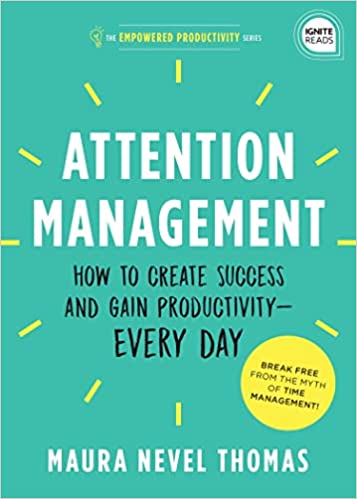by Maura Nevel Thomas
Every day at work might be making you more distractible. Here’s how to tell: consider how much of your day at the office is spent switching among reacting to problems, checking emails, and dealing with interruptions from your colleagues. Do you often have many things open on your desktop that are only partly done?
Distractibility is Caused by Multitasking
Studies show that on average, we switch our attention every few minutes due to a distraction. This “switching our attention” is also what’s known as “multitasking.” Your brain can’t actually do two things at once, like write an email and deal with your interrupting co-worker. What actually happens is that you switch between one and the other.
It is important to know if you are like the “average” person in the study, because if so, it creates an insidious problem: switching your attention every few minutes first causes distraction to become a habit, and then reinforces that habit every few minutes, so it becomes a really strong habit. The more we allow ourselves to get distracted, the more easily distracted, or distractible, we become.
A habit of distraction shortens your attention span. It makes you more impatient. This “chipping away” at your attention span and your patience undermines not only your ability, but also your desire to do thoughtful work. It undermines your ability and desire to apply your brain power in a meaningful way. To reverse this damaging trend, you need to think about changing the behaviors that have led to you becoming so distractible, so that you can live a life of choice rather than a life of reaction and distraction.
Attention Management is the Solution
Practicing attention management means changing your behavior so that you consciously choose where you direct your attention. You stop reacting to the endless stream of problems, emails, and interruptions and start doing more thoughtful work. At the end of the day, you’ll feel productive and satisfied, rather than burned out and frazzled.
Changing your behavior at work can seem daunting. After all, you may have established a routine over many years. You get to the office, check email, respond to any “fires,” attend a meeting, send out any promised meeting follow-ups, check email again, and on and on. It’s familiar, it’s easy, and it seems to have worked for you in the past.
But how often do you do the deep thinking work required to move your important projects forward? When do you ever complete the big task that you keep putting off because it requires concentrating for an extended period of time?
Kick Your Habit of Distraction
One important way to become less distractible is to take a hard look at the behaviors that led to it. Are you intentionally creating the conditions that will allow you to accomplish your most important work? Or are you just constantly reacting to the demands of others?
To evaluate your productivity, take a look at your list of projects (the big picture activities that will really “move the needle” for you). At the end of the week, return to your list and write down the answers to these questions:
- How many of those projects moved forward this week?
- Which did you expect to make progress on, but didn’t?
- How often was your time diverted from the tasks that you deemed most critical?
Just by doing this exercise, you will begin the process of managing your attention. Becoming aware of how often your attention is being stolen is a critical ingredient for change.
Who stole your attention?
Examine your findings and try to identify what tasks, issues, or people distracted you during the week. How many times did your colleagues drop an “urgent request” on you? Did the typical onslaught of emails take more time than you expected?
Once you identify the attention thieves in your work life, you may see the benefits of learning the attention management skills that will keep you on the path to peak productivity.
To learn more about behaviors that sabotage your attention and your productivity and how to change them, read my new book: Attention Management: How to Create Success and Gain Productivity Every Day. I wrote it for busy knowledge workers like you. And the good news is that it’s designed to be read in only one hour.
I’m confident it will help you to say goodbye to a routine where you’re busy, busy, busy all day long but at the end of the day, you’re hard-pressed to point out what you’ve actually accomplished. Instead, it will help you manage your attention and be less distractible, so you can be more present, unleash your genius, and achieve what’s most important to you.
*This article originally appeared at MauraThomas.com.
______________________________________________________________________________

Maura Nevel Thomas is an award-winning international speaker and trainer on individual and corporate productivity and work-life balance, and the most widely-cited authority on attention management. Her proprietary Empowered Productivity™ System, a process for achieving significant results and living a life of choice, has influenced the practices at organizations such as the U.S. Army, L’Oréal, and Dell. She is a TEDx Speaker, founder of Regain Your Time, author of three books, and was named a Top Leadership Speaker for 2018 in Inc. Magazine. Maura is frequently cited as an expert in major business outlets including Forbes, Fast Company, and Huffington Post, and she’s also a regular contributor to the Harvard Business Review, with articles there viewed over a million times. Follow her on Twitter.





